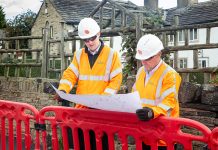Members and guests from the Midlands Area attended a thought provoking and interesting presentation about smart energy metering. The paper was presented by Dene Marshallsay who is a consultant with Artesia Consulting. He has a strong background in water demand management and metering and he is one of the co-founders of the Intelligent Metering Initiative (IMI). He has recently been reporting on the opportunities for multi-utility metering for the water sector.
The background to the paper is that Government is pushing ahead with plans to install ‘Smart’ energy meters into every household in the UK by 2020. This is a massive undertaking and will be the largest and most complex change-over programme in the energy industry since the switch to North Sea gas in the 60’s and 70’s. Twenty six million households will be visited, 46 million meters will be installed and the means to get data to and from every home established; all in a period of about 7 years from 2012. The presentation gave the background to the smart energy metering programme and explored the linkages with water metering. It discussed whether this is a missed opportunity or whether there is still time to exploit the planned infrastructure for smart energy metering.
The audience were informed about the background and drivers to smart energy metering. These drivers include climate change; a low carbon UK; supporting consumers and protecting the UK energy supply. Her Majesty’s government has also published a plan which sets out that a 34% cut in emissions is expected by 2020. Evidence has been collected which shows that energy use in the home has been fairly steady since 1990 with a very slight decline. Dene then talked about the consumer and the environment. If the consumer can obtain a degree of control over how much energy is used and the suppliers can obtain more useful and real time data about energy use then other issues can be controlled. Consumers could reduce energy use in the home, less energy production should lead to CO2 reduction, as energy prices rise then consumers will have learned to monitor usage, the suppliers can manage the load/demand especially during critical demand periods. Other initiatives include a tariff basket which will aim to reduce peak energy use and the facilitation of local renewable energy generation. The initiative should also lead to more accurate bills and faster and easier ‘switching’ of suppliers.
There followed a section on the potential functionality of the meters which included remote reading; two way communication with the meters; home area networks where a consumer could view an ‘on screen’ display of the energy use in the home; real time data for the suppliers so that loadsdemands can be managed and remote disablement of supply (and enablement). The smart meter installation process is expected to commence in 2012 and at the peak, there could be c100,000 meters per week being fitted. The audience were then updated about the proportions of water meters in use within the different water supplier’s areas. The penetration of water meter use varies regionally. The forecast of meter usage in 2015 will range from 30% to 90% depending upon which water company’s area you look at. (This will include a mixture of internal and external maters).
The link between water use and carbon was established which included an explanation about how monitoring energy use could lead to less water being heated and hence less consumption. This includes heating water in showers, hot tap use, bathing, clothes washing and dishwashing. Therefore, less energy use equals less water use, less water production, less pumping and less wastewater to be removed. There is also the benefit of being able to monitor actual household consumption and the ability to calculate the amount of water entering the distribution system and actually being consumed so that more accurate leakage figures can be ascertained. It should also be mentioned that as more modern construction methods are employed then less energy would be required to heat water for heating. Evidence shows that metering encourages consumers to change behaviour. Hopefully, consumers will obtain water efficiency devices and advice as meters are installed. So there could be opportunities for water conservation initiatives to piggy back off the smart energy communications and roll out activities.
The talk concluded that there is still time for the water sector to take advantage of the opportunities arising from the smart energy rollout programme. This will only happen however if the water sector engages with the energy metering programme during the coming year.
This presentation can be viewed on the Archived Events section of the website.





